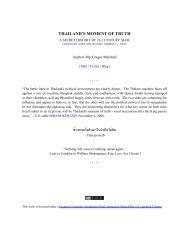THAILAND'S MOMENT OF TRUTH - ZENJOURNALIST
THAILAND'S MOMENT OF TRUTH - ZENJOURNALIST
THAILAND'S MOMENT OF TRUTH - ZENJOURNALIST
You also want an ePaper? Increase the reach of your titles
YUMPU automatically turns print PDFs into web optimized ePapers that Google loves.
them with humility and meekness. Indeed, more gentle methods would have been looked upon as<br />
signs of weakness, since fear was the only attitude towards the throne which was understood, and<br />
tyranny the only means by which the government could be maintained...<br />
Despite the fact that all were equally of no account in the presence of the king, a many-graded<br />
social organization had evolved, and the ingrained habit of fear and obedience produced a deep<br />
reverence for all forms of authority.<br />
Near the top of the hierarchical pyramid - though still far below the lofty realm of royalty - were minor<br />
nobles and bureaucrats, and below them the rest of the people, branded to make clear their status as the<br />
property of the state:<br />
All these officials were continually occupied in showing the necessary amount of deference to<br />
those above them, and to the king at the top, while mercilessly grinding down those below them<br />
in the social scale...<br />
The great mass of the people were divided into a number of departments for public service... the<br />
members of which were numbered and branded by the noblemen in charge of each department.<br />
The luckier ordinary citizens could escape compulsory obligations to the state in return for paying tax. As<br />
for the rest:<br />
The vast majority of the people... were collected in rotation as required, obliged to serve as<br />
soldiers, sailors and other public menials... for whom no escape was possible, the status being<br />
hereditary.<br />
At the very bottom of the heirarchy were slaves, although Quaritch Wales says reassuringly that “it must<br />
be added that Siamese slavery was always of a very mild type”.<br />
Thailand’s King Chulalongkorn, Rama V - grandfather of both Bhumibol and Sirikit - launched a<br />
dramatic modernization of Siam, something Quaritch Wales appears to feel rather ambivalent about:<br />
The reforms of King Rama V brought about great changes, many of them for the better, in the life<br />
of the Siamese masses. One of the most far-reaching of these was the abolition of slavery; another<br />
was the abolition of bodily prostration of inferiors in the presence of their superiors.<br />
Despite efforts to modernize the monarchy and Siam’s social structures as the kingdom came into<br />
increasing contact with the West, Quaritch Wales argues that the country’s people still maintained<br />
enormous reverence for royalty after many centuries of brutal tyrannical rule:<br />
So great, it might be added, are these hereditary instincts, that bodily prostration still lingers to<br />
some extent, although it is, of course, entirely voluntary. Siamese servants often crouch in the<br />
presence of their masters, officials lie almost full length when they are offering anything to the<br />
King on his throne and I have seen ladies of the older generation crawling on their hands and




